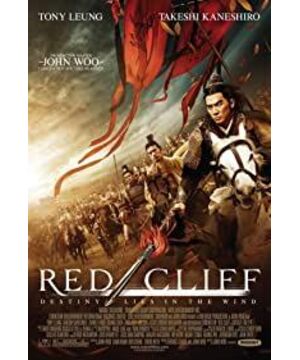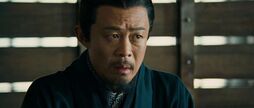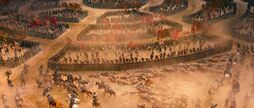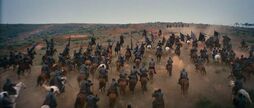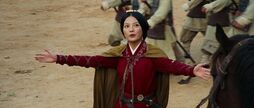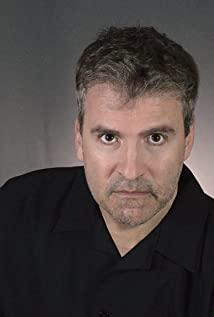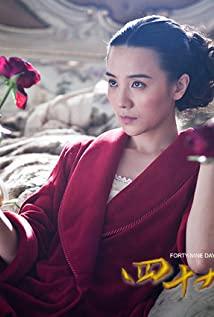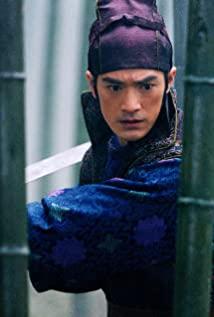I can't wait to see "Red Cliff". Not only because of various rumors or publicity about the film for a long time, but mainly because of the expectation of "self" in my heart.
The story of "Red Cliff" is one of the classic chapters in "Romance of the Three Kingdoms", and Chinese people probably know a thing or two. Putting such a nationally-known story on the screen will face more pressure, but it requires more courage and self-confidence, not only for ourselves, but also for our culture. This is a movie made for Chinese people, or a movie that can be understood by Chinese people.
Due to the large number of characters and unfamiliarity with history, foreigners may not be able to understand "Red Cliff". But I think they will be shocked by our tactics and tactics. The strategies in "Troy" and "Braveheart", placed in the context of Chinese history, are at most elementary school levels. What a Trojan horse plan, go and see our empty city plan!
"Chibi" has many scenes showing the wisdom and strategy of the Chinese people. For example, gossip formations, not to mention whether there are such formations in history or in the art of war, but the design in the movie is quite similar. From the beginning, the infantry used shields to reflect light to block Cao Cao's cavalry, to the later divide and conquer, the design is still very delicate. In ancient military affairs, infantry was often crushed by the impact of cavalry, so they always chose some special methods to divide the cavalry or delay the impact of the cavalry to maintain their combat effectiveness. This time the gossip array is really interesting, it reminds me of tunnel warfare and mine warfare.
I really like the part of Zhou Yu and Zhuge Liang's "Qin Gao". The music is good and goes well with the scene. Two completely different ways of expressing, Zhou Yu's piano sound seems to have always been the main theme, from self-protection at the beginning to hesitation to anger and then to choice, but Zhuge Liang's piano sound is from temptation to temptation to rapid encouragement and finally to the end. The cooperation and support of Zhou Yu, although it is cooperation, but the guidance of Zhou Yu's main theme, and finally the two reached an agreement, but Zhou Yu is still high-profile and strong, while Zhuge Liang is low-key and confident.
The part where Zhou Yu and Cao Cao were arranging the offensive strategy at the same time was actually not bad. They guessed and predicted each other, showing the wisdom and courage of strategizing and winning thousands of miles. Whether it was Zhou Yu and Zhuge Liang's inducement that made Cao Cao attack with water, or Cao Cao's arrogance and arrogance made him use the navy that he was not good at. Changes in the character's character and the situation of the battle are implicit in it.
"Chibi (Part 1)" actually doesn't have too many exciting scenes, probably because the focus and climax of "Chibi" is in the second episode, and the first episode has a lot of foreshadowing. It seemed that the tense atmosphere before the war and the deterrence of Cao Cao's army were not enough. This is slightly less than "The Lord of the Rings". It may be because of the limited space, or because we all know the final result of "Chibi", so it feels like too much foreshadowing and it seems protracted and tedious. I can't wait to set fire to the boat directly.
To some extent, "Chibi (Part 1)" is more like a character introduction. There are bright spots in the arrangement of characters, but of course there are also shortcomings.
The appearance of Cao Cao is quite domineering and majestic, and the coldness is pressing, which is enough for him to appear on the stage. Wu Yusen used his usual "bird release" segment to portray the childishness and weakness of Emperor Xian of Han, and the helplessness and helplessness of civil and military officials, creating a suitable atmosphere for Cao Cao's strong appearance. Zhang Fengyi's Cao Cao is generally quite good, because of his consistent temperament, he is not too laborious to act, and of course there is not much breakthrough.
After that, the "strong" Zhao Zilong should appear. Although he is still handsome, his martial arts are excellent, and his action design is also beautiful, he looks like "Qiao Feng". I am actually looking forward to the performance of "Zhao Zilong", not only because of the temperament of the historical figure itself, but also to see how the "strong" Hu Jun interprets the young and successful Changshan Zhao Zilong. Of course I haven't seen Zhao Zilong with my own eyes, but Hu Jun's Zhao Zilong is basically qualified.
Later, the most handsome Zhuge Liang in history appeared! He always rides a horse, it's a little fun! It's not the same as the Zhuge Liang I imagined. Maybe it's too handsome, and it's not clever enough. Especially the performance at the beginning is a bit deliberate. However, with the deepening of the film, Zhuge Chengwu still found the feeling, and gradually entered the play, and it became more natural. Fortunately, the "Qin Jiao" part was not performed badly. Because of Zhou Yu, Zhuge Liang in "Red Cliff (Part 1)" could not attract much attention. The mouth full of "slightly understand" makes people feel that this Zhuge Liang is really funny!
Sun Quan's appearance makes me feel fresh, Zhang Zhen's performance is quite solid and expressive, which is really eye-catching. Without the free and loose "Luo Xiaohu", there is more hesitation of the young and old. Although he expressed a strong desire in his heart, he was suffering from the current situation, and Sun Quan groped and waited in hesitation. Sun Quan's ability to keep a low profile and bide his time was fully demonstrated in Zhang Zhen's body. This character is the most successful characterization of the film so far. Before watching the movie, I'm afraid no one expected it.
I am afraid that the foreshadowing of Zhou Yu is the most. I don't know if it is the need of the film or John Woo's special liking. We can only see the back of Governor Zhou in the two-minute scene. Later, a special section of Zhou Yu was arranged as Niu Tong's school voice, which specially showed Zhou Yu's talent and temperament. In fact, this scene can make people understand the tragedy that Zhou Yu's character brought him later. In this relatively closed scene, Zhou Yu has a natural sense of superiority and conceit for his troops, cattle boys and old farmers, and even the nature around him. This sense of superiority and conceit is in this relatively relaxed and closed environment. It appears natural, peaceful and comfortable. However, after leaving Jiangnan Zhou Yu, or after the Three Kingdoms went all out, Zhou Yu was "fortunate" to recognize the outside world, and to recognize all kinds of talented people with different personalities, especially the appearance of Zhuge Liang, which made his sense of superiority and Ego has become a burden in life, and facing failure is the beginning of losing peace, nature and comfort for Zhou Yu. Therefore, we can understand that when Zhou Yu came to Liu Bei's army and saw Guan Yunchang who was teaching, Zhao Zilong, a first-rate martial artist, Zhang Fei, who was strong in character, and Liu Bei, who loved to weave straw shoes, Zhou Yu showed a look of surprise and confusion on his face. , Zhou Yu's complex psychology gradually began. Zhou Yu, who was originally calm and detached, when he saw Liu Bei's tiger generals attacking the enemy in front of him, he couldn't help himself go into battle, defend Zhao Zilong from arrows, and draw arrows to stab the enemy generals to death. Although domineering, although more than free and easy, Zhou Yu began to lose his temper. For him, always striving for the first is his life creed. To be honest, at first I thought Tony Leung was not suitable for playing Zhou Yu, after all, he was a little older. But in the end Tony Leung played this scheming and complicated character extremely well. And in the traditional plays in the past, Zhou Yu is always inferior to Zhuge Liang's image stereotype seems to have been deeply rooted in the hearts of the people. Liang Chaowei's interpretation challenges the tradition. It can be said that in "Red Cliff (Part 1)", Zhou Yu left a far deeper impression on the audience than the handsome Zhuge Liang.
If you don't know Lin Chiling before, and you haven't heard her voice, then at first glance, Xiao Qiao is really a beauty. Unfortunately, lines like "Shh, don't scare it!", "Come on, Chu Chu, stand up!" and "Are you really going to fight this war?" made me feel like the temperature of the air conditioner plummeted. If you don't speak, "Xiao Qiao" is still very serious in interpreting the most eye-catching woman in the Three Kingdoms era. The arrangement of the scenes and the design of the scene, Xiao Qiao's performance has not had much chance so far. I don't know if it's lucky or unfortunate, but in any case, Xiao Qiao works hard and it's okay. Qualifications are like this, don't be too demanding.
The battle of Chibi itself decided that Liu Guanzhang's role in "Red Cliff" would not be too prominent. Therefore, the choice of characters is relatively arbitrary. Zhang Fei's technical content in "Red Cliff" is not high, but he is sturdy and mighty. Liu Bei's appearance is quite satisfactory, like a village cadre. For the time being, he has nothing to do with him, and many scenes have been taken away. Maybe when you marry Sun Shangxiang, there may be some opportunities to show, I hope it's not too wretched. I originally liked Guan Yu the most, but this Guan Yu is not very handsome, and the character image can be justified, but the temperament is lacking, the loyalty is not enough, and the honesty is more than simple. Maybe it was also influenced by the role. However, the repertoires of Cao Cao and the empty-handed guns in the gossip array are still quite infectious. Since Zhao Wei starred in "Jinghua Yanyun", I have changed my opinion of her. Her role as Sun Shangxiang is indeed heroic and valiant! Although sometimes it is as silly as a swallow, but overall, it has exceeded my expectations, not bad. As for Gan Xing, I admire his hard work and seriousness, but always feel that he will shout "Huo-yuan-jia" in Japanese Mandarin at any time. Other characters, not to mention. Lu Su's role will be in the next episode, let's talk about it later.
The film does have a laugh scene, mainly focusing on Xiao Qiao's classmate. As I said earlier, don't be too demanding. So give up. John Woo also continued his routine in "Chibi" - putting pigeons and slow-motion scenes.
Woo wants to express too many things, which makes the film seem a little hesitant. I want to show the splendid culture and glorious history, but also want to be less serious and nervous, so I added a lot of funny dialogues and scenes, trying to make the film a little light and humorous. But "Chibi" has its historical roots after all, and it would be too absurd if it was completely separated from the historical background. Therefore, between respecting history and the original work and adapting and re-creating, John Woo is hesitant. At least in "Chibi (Part 1)", this hesitation makes the overall look of the film a bit messy, and the emotional color is not prominent and strong enough. Wu Yusen also tried to make "Chibi" look more human, not just a simple pile of war and history. The warm life between Xiao Qiao and Zhou Yu, the special relationship between Zhou Yu and Zhuge Liang, the hesitation between war and surrender when Sun Quan was ordered to make a major decision when he was young, and even Cao Cao for Xiao Qiao And the "selfishness" of the handsome army going south makes people see the historical figures with flesh and blood. Whether successful or not, John Woo at least did not use simple "good" and "bad" to understand the characters of the Three Kingdoms, let alone "black" and "white" to monotonously describe this magnificent history. John Woo is interpreting and reflecting the "Chibi" in his heart in his own way, whether it is changing, innovating, or contrived. In any case, "Chibi" still makes me feel something new.
Since the Golden Bear Award was released in the sorghum field, Chinese-themed films have either reflected the countryside or the Cultural Revolution, which always makes people feel gloomy and backward. Reality is important, but it's always so realistic, and it's starting to make people wonder if "exposing one's shortcomings" to please outsiders is the only way out for Chinese films? Apart from these, is there anything else we can show outsiders? I even began to suspect that this desire to "show shortness" is taken for granted by some filmmakers, and they never tire of it.
Before the filming of "The Wind Whisperer", John Woo said that "The Wind Whisperer" is actually a preparation for him to one day be able to shoot an epic blockbuster about Chinese history. Wu Yusen, who has always been known for action movies, hopes to cultivate his ability to grasp and express himself in big scenes through "Wind Whisperer". I never expected Chibi to get rave reviews, after all it's just a commercial. But I will not hold prejudice against it because it is a commercial film. No film is perfect. If we expect a commercial blockbuster to have any profound truth or high artistic value, then we are too much. Too demanding. We don't need to introduce the morbid psychology of "elite culture" in the movie, because that is the needs of very few people. We are lay people, lay people can enjoy the gorgeousness of business. In the past, we made a lot of commercial blockbusters in order to cater to outsiders. Since it is a commercial film, we have to sell things. We have sold "steamed buns" and "chrysanthemums", and we have created a "miracle of immortality". Today, "Chibi" is selling history. Although China's history is all business, some people are finally starting to regain themselves and return to themselves. Today, John Woo has fulfilled his wish and fulfilled his promise. I have nothing against him.
In the cinema, people are carefully reading the brief introduction to the characters and history of the Three Kingdoms on the propaganda posters. There are old people and children. We are paying attention to a story that we almost forgot, about ourselves. Based on this, "Red Cliff" should be appreciated.
The long-lost self made me feel at ease.
Zhou Yu and Zhuge Liang's dialogue about the relationship between the two sides after the Battle of Chibi, people can feel the sympathy between Zhuge Liang and Zhou Yu. I began to believe that after Zhou Yu's death, Zhuge Liang shed tears for his "confidant". What I'm most looking forward to in "Chibi (Part 2)" is not the spectacular "Burning Chibi", but to see how John Woo arranges and handles the relationship between Zhou Yu and Zhuge Liang. The transition from friend to foe is more intriguing than the outcome of a war itself.
http://hi.baidu.com/estrange523/blog/item/4b3f6e7f9514060e29388a4f.html
View more about Red Cliff reviews


